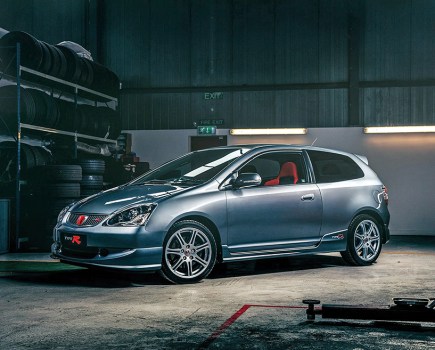This immaculate, turbocharged Honda Civic Type R FN2 with 765bhp sets a new benchmark for modified Hondas.
Seven hundred and sixty-five horsepower. It’s an impressive figure for something with a big engine, a 2JZ Toyota Supra Mk4 for example. Or a dedicated drag car. But for a road-legal, front-wheel drive modified Civic Type R with a relatively humble 2.0-litre inline four under the bonnet, 765bhp is just insane. Beautifully, wonderfully insane.
Tuning an engine to more than treble its output is an expensive puzzle. Building a mint show car is time-consuming, but we’re sure Adam would point out he never set out to build a show stopper, or particularly considers his turbocharged Honda Civic Type R FN2 to be one. However, doing both to one car is a costly, labour-intensive challenge that would defeat most sane people. Fortunately, 30 year-old Adam Flowers isn’t sane. Hang on, this isn’t coming out right…

What we mean is, Adam has a special kind of commitment that only the most speed-addicted performance tuning junkies possess. He’s the kind of guy that doesn’t understand the phrase ‘that’ll do’, let alone uses it. He’s far more likely to do his best Oliver impression and ask for more – as the tortured K20 engine hidden under that Tegiwa carbon-fibre bonnet knows only too well.

FN2 naturally-aspirated tuning
‘It all started with a simple HKS induction kit,’ remembers Adam with a smile. ‘The kit sounded phenomenal, you could really hear the VTEC crossover.’ How many more innocent young wallets is the VTEC bark going to empty? This seems to be a reoccurring theme among Honda heads. Although few go as far as Adam.
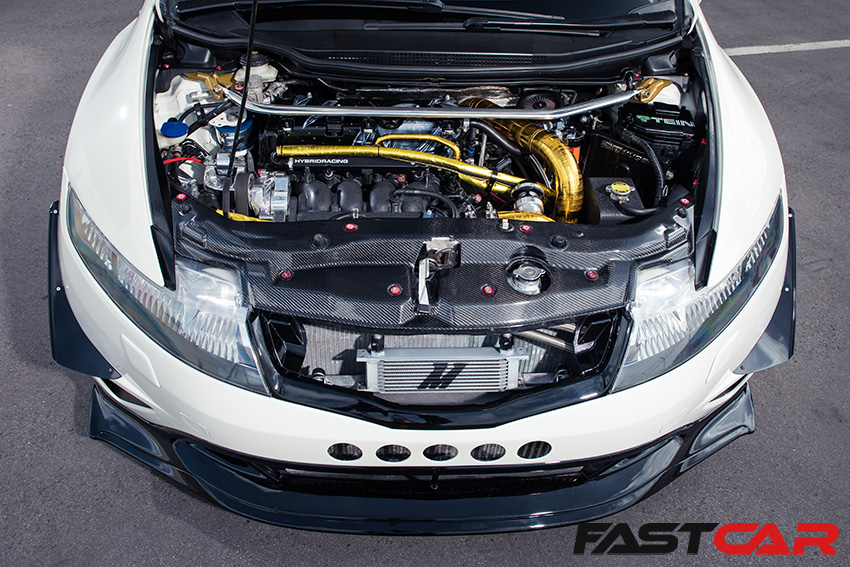
‘I bought the car way back in 2011, with about 17,000 miles on it,’ he adds. ‘Championship White FN2s were rare at the time, they only made 600 Championship Editions in total and I’d never seen one before I bought mine. It was something a little different, and stood out from the rest of the FN2 Type Rs. In excellent original condition with only one previous owner, it was the perfect base to build a tidy, fast car.’
Within weeks, Adam had started the transformation. Initially he went down the NA route, aiming to improve the car for the road with occasional track use. The engine tuning focused on breathing mods including an RRC inlet manifold with a J35 throttle body, a Tegiwa exhaust manifold and a Milltek Sport non-resonated exhaust system. Honda tuning gurus TDi North remapped the car using Hondata Flash Pro, where it kicked out 240bhp. A decent hike from the original claimed output of 198bhp.
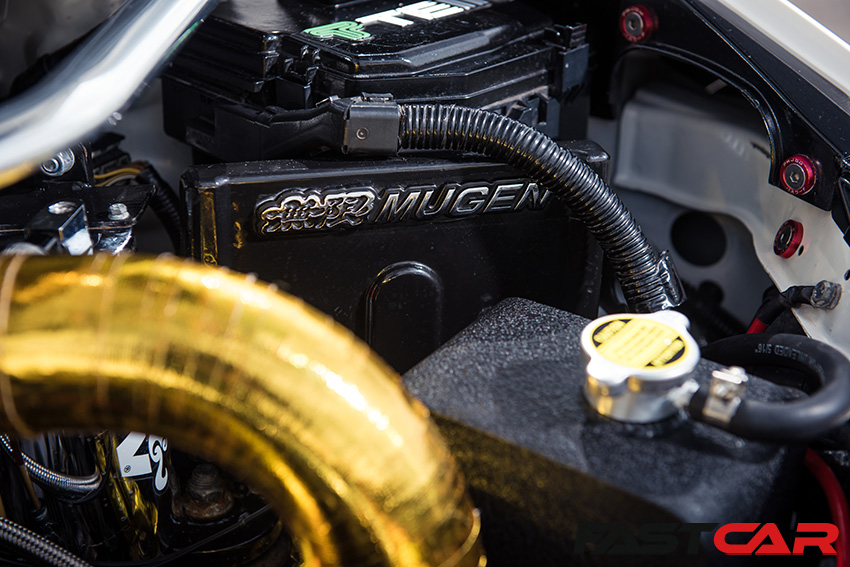 Initial chassis changes
Initial chassis changes
At this point Adam discovered a couple of surprisingly effective upgrades. He explains: ‘I fitted some Eibach 30mm lowering springs and had a fast-road geometry setup that transformed the way the car handled. I know some people point out the FN2 has a solid rear beam rather than the independent rear suspension on other Hondas like the earlier EP3, but the bodyshell is also significantly stiffer than the EP3 too. After the alignment it was so much more planted in the corners, and is definitely a worthwhile mod.’
He also bought a used set of Stoptech Touring Series brakes off one of the Honda forums. ‘I actually couldn’t believe the difference, I was never impressed with the OEM brakes but the jump was massive. For a long time the brakes were my favourite upgrade and I would recommend them to anyone tuning an FN2.’
Time for forced induction
Shortly after, Adam took his increasingly hot Honda to its first track day at Oulton Park, where it performed well, with no issues there or on the drive home. However, there was a much more epic transformation just around the corner. Adam remembers: ‘I did some bodywork next; Mugen-style front splitter and rear spoiler, GP rear diffuser, black mirrors, etc. After a while I started looking at ways of getting more power.’
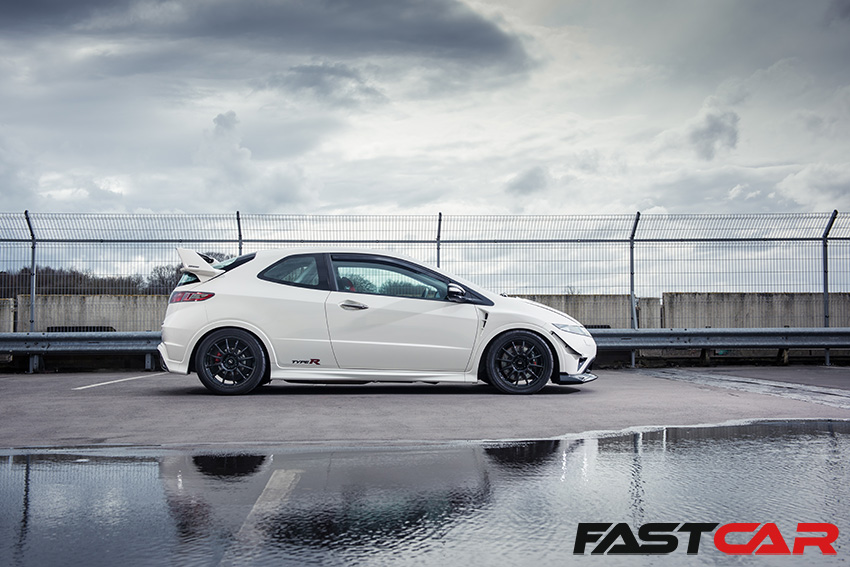
‘For me, NA tuning is such a costly exercise and I didn’t think it would return the power I wanted anyway, so I started looking at the pros and cons of supercharging or turbocharging the engine. I did lots of research but seeing a 500bhp turbo FN2 tuned by TDi North in action cemented my mind. It wasn’t just the power, it was all the turbo noises I loved too, the roar of the screamer pipe.’
Adam ordered a TDi North GT30 turbo kit, along with a stage four Competition Clutch and Wavetrac 4.7 limited-slip differential to help put the power down. Initially, the turbo kit bolted onto the standard K20Z4 engine. With the turbo blowing through the Milltek Sport 2.5in exhaust, and the Hondata Flash Pro still enabling the ECU tweaks, initial power was 370bhp, but after a few weeks that was turned up to 400bhp, then 425bhp and soon after 450bhp.
Unfortunately, one spirited drive resulted in him stripping fourth gear. This was a turning point in the project. But after spending a few quid, Adam knew he was at a crossroads. One way involved spending even more money to ‘do it properly’, the other was to just sell what he had and move on. He was seriously considering throwing in the towel.
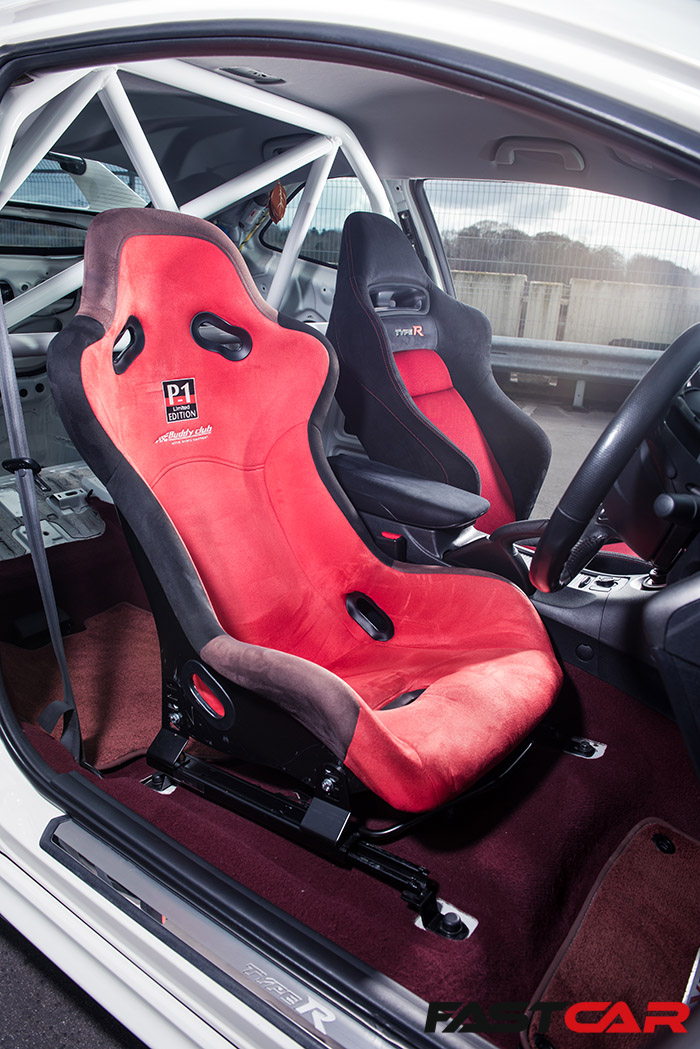
Forged engine and upgraded transmission
Thankfully he came to his senses, priced up a 600bhp build with the guys over at TDi North and dropped his car off for work to begin. He admits: ‘It felt like taking ten steps back from the 450bhp I had and starting again, but I’m so glad I did it now.’ To prevent a repeat of the gearbox issues, Adam bought a list of upgrades including a PPG 1st to 4th gear set, plus MFactory carbon synchros and uprated driveshafts. An even bigger investment went into the engine.
Clockwise Motion in Worcestershire have built some of the most powerful K-Series engines in existence. While TDi North have tuned some of the fastest Hondas around, including cars that have dominated in the UK Time Attack Championship, VTEC Challenge and the Jap Drag Series. These tuning superpowers combined to create something very special. Clockwise Motion provided a short motor (sleeved block with a fully built bottom-end), along with a fully worked-over cylinder head. These were then assembled and ultimately tuned at TDi North, who by this time had replaced the Hondata with EcuTek management. The results were incredible.
700bhp+
With a GTX3582R turbo in place of the GT30, power quickly shot up to the 700bhp mark. ‘I was over the moon with that,’ says Adam, ‘that was way more than I expected, but TDi reckoned there was much more to come. And they were right! We ended up at 765bhp at 23psi of boost, a new record for a road-driven FN2 in the UK and possibly even Europe too! I was blown away. I never expected that result.’
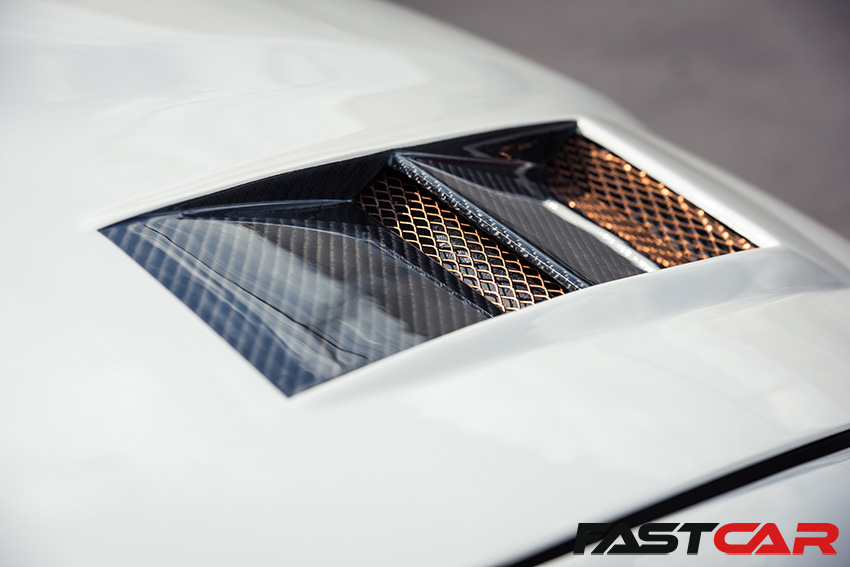
What the turbocharged Civic Type R FN2 is like to drive
So what’s it like to drive a front-wheel drive car with 765bhp? ‘Surprisingly easy,’ claims Adam. ‘I don’t actually use the traction control at all, just my right foot. Obviously if you’re heavy on the throttle it will spin up and won’t stop wheel-spinning until the top of third gear, in the dry. So it’s a monster if you want it to be, but it also grips amazingly well if you drive it properly.’
It’s a real looker too. We love the black and white theme, particularly the aggressive front-end with the bumper cut-outs, canards and the minimalist front grille. ‘Yeah, I’m really pleased with the grille,’ says Adam. ‘A few people have told me it looks unfinished but I like the fact it exposes all the coolers. It’s just a standard grille with the centre section cut-out. Everyone has a Mugen grille but I wanted something different.’
A lot of attention has been paid to the finer details too. The colours of the Buddy Club bucket seat neatly match the original passenger seat. Equally, Adam has made good use of the crackle black finish under the bonnet. If it wasn’t for the gold heat-wrapping and Hybrid Racing fuel rail, you might not suspect Adam has touched much under there. Until he starts it up that is.
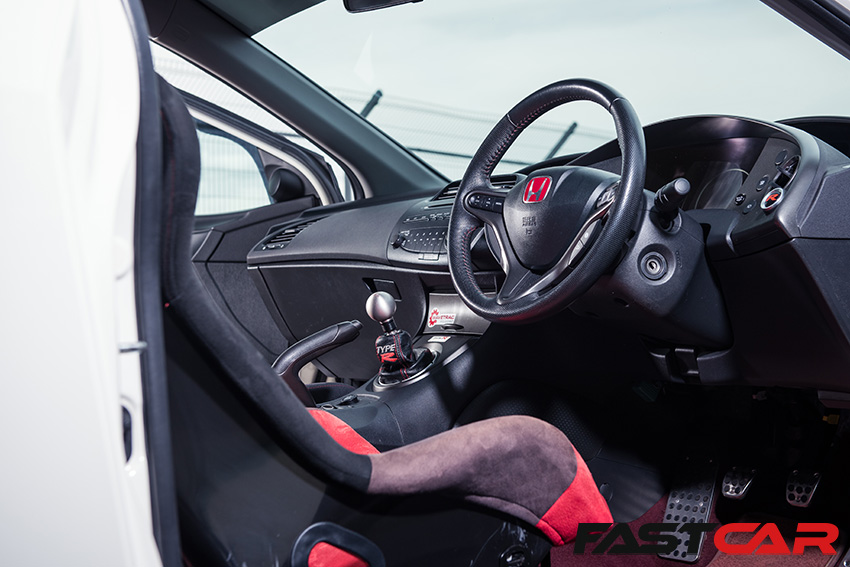
Verdict
It’s hard to get over how well presented this FN2 is. The mighty power figure will always grab the headlines but it’s not until you have a good look over the car, that you realize every single component is beautifully presented.
We often talk about performance tuning as being a game of compromises. You aren’t supposed to be able to have it all. However, Adam’s car demonstrates how small you can make those compromises, if you have a clear vision and the determination to push it through. Having the support of experienced tuning companies at the top of their game helps too. This front-wheel drive street car has just re-written the rule book. Seven hundred and sixty five brake horsepower. That’s not just raising the bar, that’s throwing it into orbit.

Billet Turbo For Honda Civic Type R FN2
The Garrett GTX3582R turbo hiding in the engine bay spins the wrong way. Unlike most turbos, this second-generation ‘supercore’ turbo spins anti-clockwise. This helps it squeeze into the Civic’s engine bay along with all the necessary piping. It features a stainless-steel .82 v-band turbine housing made by AET Turbos and has a forged billet compressor wheel. The main advantage of the billet wheel is that billet is stronger than traditional cast wheels, so it will handle more boost and abuse.
Limited Slip Differential
With just two front tyres trying to keep the full force of 765bhp under control, Adam has made some upgrades to stop them from spinning stationary. A Wavetrac LSD puts up an impressive fight, distributing power to whichever wheel has the most grip. While the tyres themselves are Yokohama Advan AD08R semi-slicks. Adam has been very clever with the wheel widths and offsets. He’s squeezed wide 235/40/17 tyres on the front, and has a pair of chunky 255/40/17s to go on very soon. Perhaps most importantly of all, the EcuTek has been calibrated to provide boost-by-gear. Less boost is available to the engine in the first couple of gears to help lay down the power.
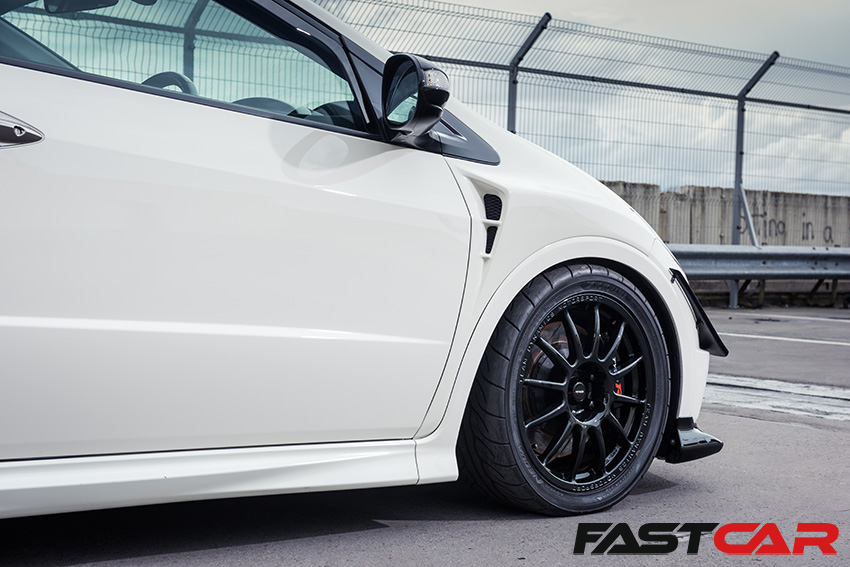
Unbreakable Engine In Turbocharged Honda Civic Type R FN2
The foundations for this monster engine are extremely sturdy. Clockwise Motion has fitted the K20Z4 block with Darton Modular Integrated Deck (MID) wet sleeves. This reinforces the cylinder walls ready for boost. The stock crankshaft is forged from the factory. This has been complemented with Saenz rods with L19 bolts and Omega pistons. A host of other upgrades help keep the engine reliable. This includes an FD2 oil pump balance delete kit, which is lighter and provides greater oil pressure at higher rpm, preventing oil cavitation.
Using Your Head
Much of the magic of the rev-happy Honda VTEC engines lies in the cylinder head. Not only because of the clever switchable cams but also the overall geometry of the combustion chamber. In short, Honda K20 cylinder heads flow really well, even in standard form. Clockwise Motion has maximised the gains in this area. With extra porting and a 3-angle valve job using a mix of the firm’s own exhaust valves and Supertech intake valves. Double valve springs and uprated steel retainers help to keep the valves under control at high rpms. The ‘head is clamped down onto a Clockwise Motion head gasket using ARP bolts.
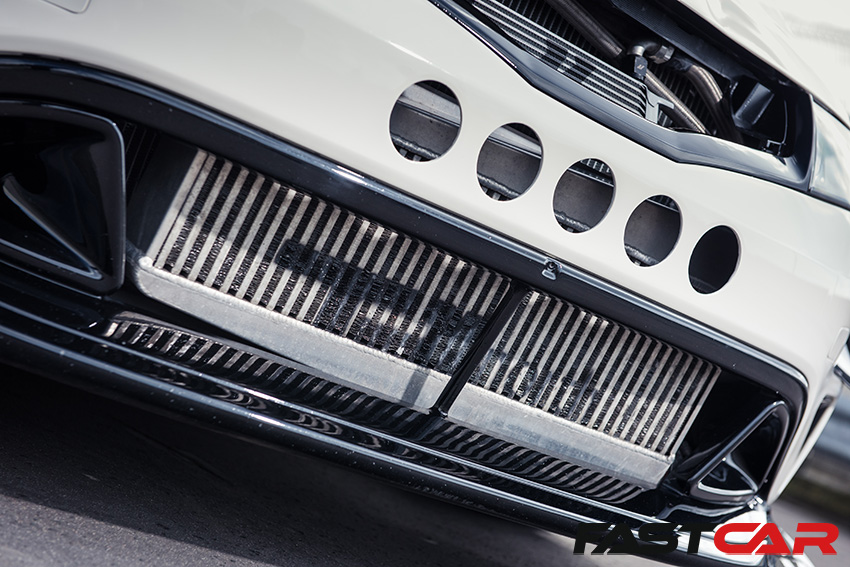
Fuelling System For Tuned Honda Civic Type R FN2
Adam points out the fuel system was one of several bottlenecks discovered along the way to 765bhp. It became a problem around the 550bhp mark. The solution was to fit a swirl pot with a combination of Walbro 225lph and Bosch 044 fuel pumps. Similarly, the 2.5in exhaust was never intended for forced induction, so TDi North fabricated their own 3in system. Lastly, Adam needed to find some colder copper-cored plugs and gap them closer. This was due to the boost pressure blowing the spark out prematurely.
ECU Wizardry
EcuTek provides the brains for this Championship Edition FN2. If you haven’t experienced EcuTek, it’s like engine management and a game app rolled into one. You can control loads of things using the app on your mobile phone, which makes changing things on the go really easy. Among the toys available to Adam are launch control, flat-shift, adjustable traction control, multiple maps, data logging and lots more besides. It’s an incredible system that we know TDi North are particularly keen on.
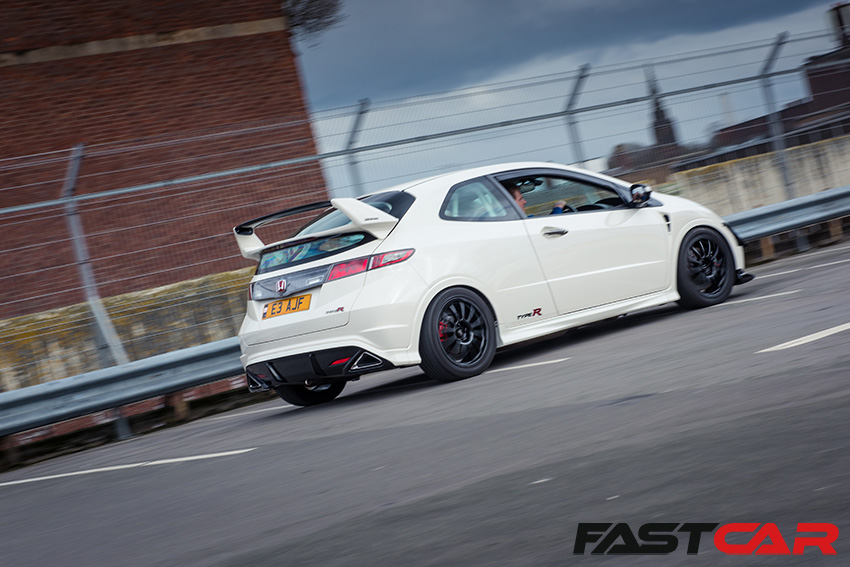
Words: Dan Goodyer. Photos: Dan Sherwood.
If you love cars like this, then you don’t want to miss out on Trax Silverstone this September 1st. In fact, we first spotted this car back at Trax 2018, and since then has developed into what you see here. It’s these types of ground-breaking cars that you’ll get to witness first hand at Silverstone. So don’t miss out! Check out the Trax event website here.


